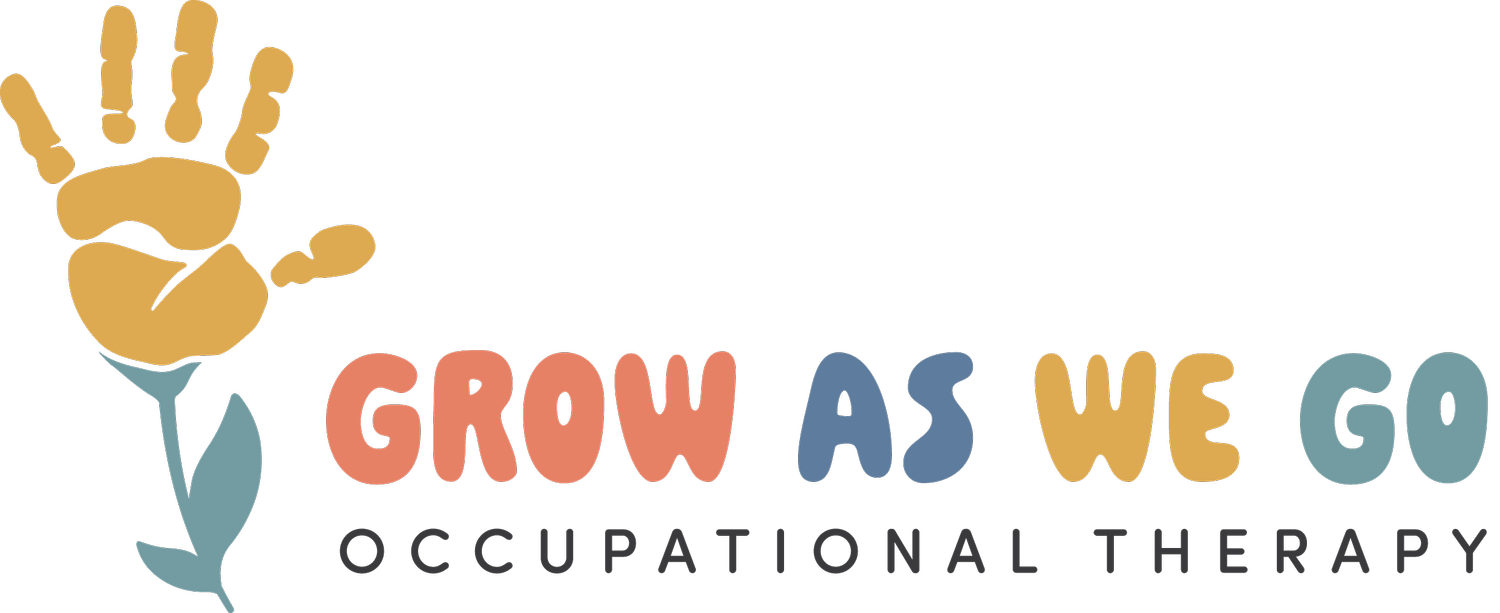Our Services
-
$235
An initial occupational therapy evaluation includes a comprehensive assessment of a child’s strengths and challenges in areas like motor skills, sensory processing, self-care, play, and social interaction. It typically involves:
A review of medical and developmental history
Parent/caregiver interview
Observation of the child during play or functional tasks
Standardized and/or clinical assessments
Goal setting based on the child’s needs and family priorities
The evaluation helps create a personalized treatment plan to support the child’s growth and participation in everyday activities.
-
$145 per 50 minute session
Ongoing occupational therapy sessions are individualized and goal-driven, designed to support a child’s development through fun, engaging, and purposeful activities. Sessions typically include:
Hands-on activities to build skills in areas like motor coordination, sensory processing, self-care, or feeding
Strategies to improve attention, regulation, and independence
Play-based interventions tailored to the child’s needs and interests
Collaboration with parents/caregivers to support progress at home
Regular tracking of goals and adjustments to the treatment plan as needed
The focus is on helping each child gain confidence and succeed in daily routines at home, school, and in the community.
-
$75 per 30 minute session
Our 30-minute parent education calls provide personalized support to help you better understand and assist your child’s development. These calls typically include:
Discussion of your child’s current progress and challenges
Practical strategies to use during daily routines (e.g., mealtimes, transitions, play)
Guidance on sensory, motor, behavioral, or self-care concerns
Answers to questions and collaborative problem-solving
Support in adapting home environments or routines for success
These sessions are a great way to stay connected, build confidence, and reinforce therapy goals between visits—ensuring your child continues to grow and thrive.
-
$50 per 30 minutes of work provided
Continuity of care and paperwork support ensures your child’s therapy stays coordinated, consistent, and well-documented. This service typically includes:
Writing progress reports, treatment plans, and goal updates
Completing school or medical forms related to therapy
Communicating with other professionals (e.g., teachers, doctors, specialists)
Providing documentation for insurance, referrals, or care coordination
Ensuring smooth transitions between services or settings
This behind-the-scenes support helps ensure your child’s needs are clearly communicated and that everyone involved in their care is working toward the same goals.
What OT Can Do For You
*
What OT Can Do For You *
Self-Regulation
Self-regulation is the ability to manage emotions, behavior, and body responses in a way that is appropriate for the situation. It helps children stay calm, focused, and in control—whether they're playing, learning, or interacting with others.
When a child has strong self-regulation skills, they can:
Handle frustration without outbursts
Stay attentive during tasks
Follow directions and routines
Cope with unexpected changes or sensory input
Occupational therapy supports self-regulation by helping children understand their body’s signals, use calming strategies, foster a resilience mindset, and build routines that promote success in everyday life.
Sensory Processing
Sensory processing is how the brain takes in and makes sense of information from the world around us—things we see, hear, touch, taste, smell, and feel through movement and body awareness.
When sensory processing is working well, children can respond appropriately to everyday experiences—like the sound of a vacuum, the feel of clothing, or the movement of a swing. But when there are challenges, a child may become overwhelmed, avoid certain sensations, or seek out intense sensory input.
Signs of sensory processing difficulties can include:
Sensitivity to sounds, textures, or lights
Trouble sitting still or focusing
Avoiding messy play or certain foods
Constant movement or rough play
Occupational therapy helps children better understand and respond to their sensory world. Through play-based activities, we build strategies that support comfort, attention, and participation in daily life.
Self-Help Skills
Self-help skills are the everyday tasks children learn to do for themselves as they grow—like getting dressed, brushing teeth, feeding themselves, and using the toilet. These skills support independence and confidence at home, school, and in the community.
As children develop, they build the motor coordination, planning, and problem-solving needed to manage these routines on their own. But some kids may need extra help learning or mastering these tasks.
Occupational therapy can support children in developing self-help skills by:
Improving fine motor coordination (e.g., using zippers, buttons, utensils)
Teaching step-by-step routines
Building strength and endurance for daily tasks
Increasing confidence and independence
Helping kids gain these skills not only supports their growth—it also gives them a sense of pride and ownership over their day-to-day lives.
Fine Motor Skills
Feeding skills involve everything a child needs to eat safely and independently—like chewing, swallowing, using utensils, trying new foods, and managing mealtime routines. These skills rely on a combination of sensory processing, oral motor coordination, fine motor control, and behavior.
Some children may have difficulty with feeding due to sensory sensitivities, motor challenges, or medical and developmental concerns. This can make mealtimes stressful for both the child and the family.
Signs a child may need support with feeding include:
Very limited food choices or picky eating
Gagging, coughing, or difficulty chewing and swallowing
Avoidance of certain textures, temperatures, or smells
Trouble using utensils, drinking from a cup, or sitting through meals
Occupational therapy helps children build positive, safe feeding experiences. We use gentle, play-based approaches to support oral motor skills, increase comfort with new foods, and promote independence at mealtimes—making eating a more enjoyable part of everyday life.
Parent Education
Fine motor skills are the small muscle movements in the hands and fingers that help children do everyday tasks—like holding a pencil, using scissors, buttoning a shirt, or picking up small objects.
These skills are essential for activities at home, in school, and during play. When fine motor skills are developing well, children can complete tasks with control, coordination, and accuracy. But when there are challenges, these tasks may feel frustrating or difficult.
Signs of fine motor difficulties may include:
Trouble holding or controlling a pencil
Difficulty using utensils or cutting with scissors
Avoiding coloring, drawing, or handwriting
Frustration with dressing or other self-care tasks
Occupational therapy helps children strengthen the muscles in their hands and improve coordination through fun, engaging activities. We work on building the skills needed for independence, confidence, and school success.
Feeding Skills
Parent education is a vital part of pediatric occupational therapy. It means working closely with families to help them understand their child’s needs, support progress at home, and feel confident in their role as caregivers and advocates.
Through parent education, we share practical strategies, guidance, and tools tailored to your child’s unique strengths and challenges. We believe therapy is most effective when families feel informed, supported, and empowered every step of the way.
Parent education may include:
Explaining your child’s developmental needs and therapy goals
Teaching techniques you can use during daily routines
Providing tips for managing sensory, emotional, or behavioral challenges
Collaborating to build routines that work for your family
Helping you navigate school, medical, or community supports
At the heart of parent education is a strong partnership between therapists and families—because when parents feel confident, kids thrive.
Social Participation/Play
Social participation and play are key parts of a child’s development. Through play, children learn how to interact with others, express their emotions, solve problems, take turns, and build friendships. These early social experiences help set the foundation for communication, cooperation, and confidence.
Some children may struggle with social participation due to challenges with communication, self-regulation, sensory processing, or understanding social cues. This can make it hard to join in group activities, make friends, or play in ways that are expected for their age.
Signs a child may need support include:
Preferring to play alone or avoiding group activities
Difficulty sharing, taking turns, or following social rules
Trouble understanding facial expressions or body language
Frequent conflicts with peers or frustration during play
Occupational therapy helps children build the skills they need to play and connect with others. Through guided activities and play-based strategies, we support social communication, emotional awareness, and positive peer interactions—helping children feel more confident and connected in their everyday lives.
Gross Motor
Gross motor skills involve the large muscles of the body that help children move, play, and stay active. These skills are needed for everyday activities like sitting upright, walking, climbing, running, jumping, and maintaining balance and coordination.
Strong gross motor skills help children participate in school, sports, and play with peers. When there are challenges with gross motor development, kids might struggle with posture, endurance, coordination, or confidence during physical activities.
Signs a child may need support with gross motor skills include:
Frequent tripping or clumsiness
Difficulty with balance or coordination
Trouble keeping up with peers in play or sports
Poor posture or fatigue during seated tasks
Occupational therapy supports gross motor development by helping children build strength, balance, coordination, and motor planning through fun, engaging movement-based activities. The goal is to improve physical confidence and help children participate fully in the things they love to do.
About Me
Hi, I’m Sarah, a licensed occupational therapist with a Doctorate in Occupational Therapy from Northern Arizona University, class of 2022. I specialize in sensory processing and feeding therapy, and I'm passionate about helping children build confidence and independence through meaningful, play-based interventions.
I grew up in Phoenix, Arizona and made the move to beautiful San Diego in 2022. Over the years, I’ve had the opportunity to work in a variety of settings—including outpatient pediatric clinics, school environments, and skilled nursing facilities—which has given me a well-rounded perspective on care across the lifespan.
Outside of work, you’ll usually find me at the beach, walking with my dog Georgie, spending time with friends, or recharging with yoga and kickboxing.
Working with children has always been a passion of mine, and I feel incredibly grateful to support families and be part of each child’s journey toward growth and independence!
Client Testimonials
Contact Me
Interested in starting occupational therapy services? Fill out some info and I will be in touch shortly. I can’t wait to hear from you!





